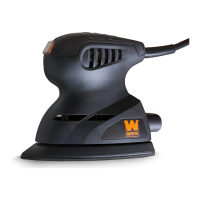OPERATION
SANDPAPER SELECTION
Choosing the right grit and material of sandpaper maximizes the quality of your sanded finish. Aluminum oxide, sili-
con carbide, and other synthetic abrasives are best for power sanding as natural abrasives, such as flint and garnet,
are too soft for economical use in power sanding.
In general, coarse grit (lower numbers) will remove the most material and finer grit (higher numbers) will produce
the best finish in all sanding operations. The condition of the surface to be sanded will determine the right grit for
the job. If the surface is rough, start with a coarse grit and sand until the surface is uniform. Medium grit may then
be used to remove the scratches left by the coarser grit while a finer grit can be used for finishing. Always continue
sanding with each grit until the surface is uniform.
NOTE: DO NOT use the sander without sandpaper. Doing so will damage the hook and loop fastener sanding base.
MAINTENANCE
BEFORE EACH USE
Inspect the general condition of the tool. Check for:
• Loose hardware
• Misalignment or binding of moving parts
• Damaged cord / electrical wiring
• Cracked or broken parts
• Any other condition that may affect its safe operation
AFTER EACH USE
Wipe external surfaces of the tool with a clean cloth.
WARNING! TO PREVENT SERIOUS INJURY FROM ACCIDENTAL OPERATION: Make sure the trigger is in the
“O” OFF-position and unplug the tool from its electrical outlet before performing any procedure in this section.
WARNING! TO PREVENT SERIOUS INJURY FROM TOOL FAILURE: Do not use damaged equipment. If ab-
normal noise or vibration occurs, have the problem corrected before further use.
WARNING! If the power cord of this tool is damaged, it must be replaced. Only a qualified service technician
should make this repair.
10

